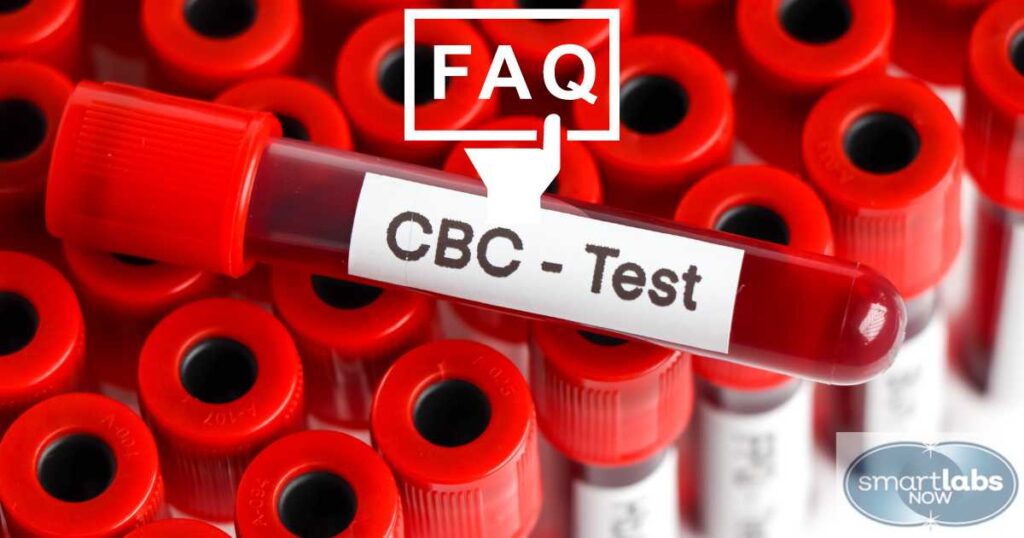
A Complete Blood Count (CBC) blood test is a fundamental tool healthcare professionals use to evaluate overall health and detect various conditions, from infections to blood disorders. This test measures different blood components, including red blood cells, white blood cells, hemoglobin, and platelets. It provides invaluable insights into a person’s health by highlighting abnormalities that may require further investigation.
Despite its widespread use, there are several misconceptions about CBC tests 🙆♂️.
Many people think these tests can diagnose every illness or that abnormal results always indicate something serious. The reality is that while CBCs are highly informative, they are only one part of a larger diagnostic process.
At Smart Labs Now, we pride ourselves on offering reliable and efficient CBC blood testing services. Our expertise helps individuals understand their results and take steps toward better health.

Mean Corpuscular Volume (MCV) refers to the average size of your red blood cells. The normal range for MCV is typically between 80 to 100 femtoliters (fL).
Some of the common causes of elevated MCV include:
Elevated MCV is not always a cause for concern, but following up with your healthcare provider for further investigation is essential.
Mean Corpuscular Hemoglobin Concentration (MCHC) measures the average concentration of hemoglobin in red blood cells. The normal MCHC range is 33 to 36 grams per deciliter (g/dL). Low MCHC values can signal several conditions, such as:
A low MCHC result indicates that your red blood cells aren’t delivering oxygen as efficiently as they should.

The COVID-19 vaccine has been a vital tool in controlling the pandemic. However, some individuals have reported temporary changes in their CBC results after receiving the vaccine. These variations are generally short-lived and do not indicate long-term health issues.
Post-vaccination, you may notice fluctuations in your white blood cell (WBC) count as your immune system responds to the vaccine. It’s important to note that these changes typically resolve on their own within a few weeks.
If you’ve recently been vaccinated and have concerns about your CBC results, rest assured that these are usually temporary. Always consult with your healthcare provider for clarity on your test results.

A CBC blood test is often required before surgery to ensure that you’re in good health and ready for the procedure. It provides valuable information for both the surgeon and the anesthesiologist.
Key insights from the test include:
Scheduling your CBC test well in advance of your surgery is crucial so that your healthcare team can address any concerns that may arise.
A Comprehensive Metabolic Panel (CMP) and a CBC blood test are often confused, but they serve different purposes.
While both tests provide important health insights, the CBC is more focused on blood health, and the CMP evaluates organ function and metabolic status. Knowing when to opt for either test depends on your symptoms and health needs.
At Smart Labs Now, we offer both and a detailed blood lipids report under our affordable ‘Comprehensive Blood Chemistry Panel’. 🙌
When MCV is lower than the normal range of 80 to 100 fL, it may indicate microcytic anemia, where your red blood cells are smaller than average. Common causes of low MCV include:
Like in every case, timely testing is key to improved health condition prognoses.
Mean Corpuscular Hemoglobin (MCH) is a measure of the average amount of hemoglobin per red blood cell. A normal MCH range is 27 to 31 picograms (pg). Some common causes of increased MCH include:
Mononucleosis (mono) is a viral infection that affects your immune system and can be identified through a CBC test. A patient with mono often shows:
If you’re feeling fatigued, have swollen lymph nodes, or experience a sore throat, a CBC test can help confirm whether you have mono.
Lymphocytes (Lymph) are a type of white blood cell critical for your immune response. A CBC test can help assess the function of your lymphocytes, especially if your healthcare provider suspects an immune disorder or infection.
Typical findings on a CBC for lymphocyte-related disorders include:

Preparing for a CBC blood test is simple. Here are a few tips to ensure accurate results:
Remember, the CBC test is quick, painless, and minimally invasive. It’s an essential tool for monitoring your overall health and diagnosing potential conditions early.
A CBC provides valuable insights into your health by evaluating the key components of your blood. Whether you’re screening for anemia, infection, or preparing for surgery, understanding your results is the first step in maintaining your well-being.
If you have any questions about our CBC blood test or want to schedule an appointment, don’t hesitate to reach out at ☎ (503) 477-7748 [Portland].
Or go ahead and make a quick booking – we’ll guide you every step of the way.
Please consult your primary care physician before engaging with any pharmaceutical, natural substances, or activity regimens mentioned or prescribed in this post. Smart Labs Now is not responsible for any health or life outcomes resulting from the use of the information or recommendations provided. This account does not serve as a substitute for professional medical advice.